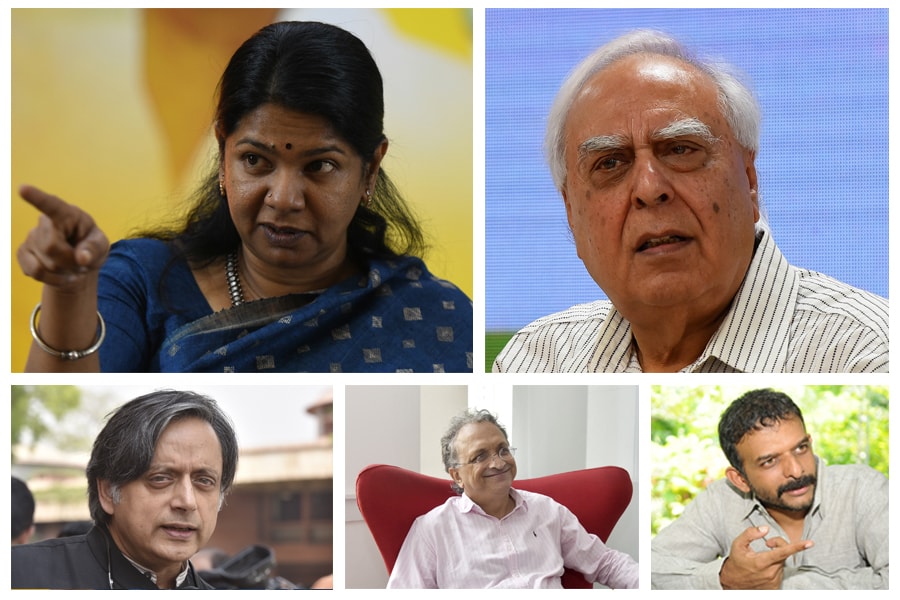
Nehru to Modi: Discussing the idea of India at the Kerala Literature Festival
Even as authors and publishers celebrated all things literary, politicians were the biggest crowd-pullers at the four-day event
 Kanimozhi: ARUN SANKAR/AFP via Getty Images; Kapil Sibal: Photo by Mohd Zakir/Hindustan Times via Getty Images; Shashi Tharoor: Photo by Sonu Mehta/Hindustan Times via Getty Images; Ramchandra Guha: Photo by Sonu Mehta/Hindustan Times via Getty Images; TM Krishna: Photo by Sharp Image/Mint via Getty Images
Kanimozhi: ARUN SANKAR/AFP via Getty Images; Kapil Sibal: Photo by Mohd Zakir/Hindustan Times via Getty Images; Shashi Tharoor: Photo by Sonu Mehta/Hindustan Times via Getty Images; Ramchandra Guha: Photo by Sonu Mehta/Hindustan Times via Getty Images; TM Krishna: Photo by Sharp Image/Mint via Getty ImagesThere is a group trying to attract the youth with non-progressive ideas of ultra-nationalism and communalism, and the country will disintegrate if their attempts succeed, said Kerala Chief Minister Pinrayi Vijayan, as he inaugurated and set the tone for the fifth edition of the Kerala Literature Festival (KLF) last Thursday. The four-day event on Kozhikode beach culminated on Sunday and saw more than 500 authors from across the world attend.
While discussions ranged from environmental protection and cultural dance forms to classical music and world travel, the one thing that bound thousands of speakers and guests involved a three-letter acronym: CAA, or the Citizenship Amendment Act. The best-attended sessions, then, were those trying to deconstruct the ongoing climate of religious strife and student protests, and whether the idea of India as we know it is changing.
The CAA, cleared in Parliament last month, makes religion a criterion for citizens for the first time. The government claims it will help non-Muslim minorities facing religious persecution in countries like Pakistan, Bangladesh and Afghanistan gain citizenship in India, while critics say the nature of the Act goes against the secular values of the Indian constitution. The National Register of Citizens, or NRC, on the other hand, will identify illegal immigrants in the country, which people believe will particularly make Muslims vulnerable to persecution.
The Kerala state government, led by Vijayan, has challenged the CAA in the Supreme Court, a move that has been opposed by Kerala governor Arif Mohammed Khan. The latter even had a panel discussion scheduled at the KLF on Sunday, but cancelled citing security reasons.
The vast expanse of the Kozhikode beach that hosted the event sported a painting of Ambedkar with the word ‘Azadi’ written against it. ‘Say No to CAA’ was scribbled at regular intervals on trees and posters. Each of the five stages hosted, at any given time, a talk or debate reflecting on the various shades of regional and national politics as it plays out in the life of the common man.
Magsaysay Award-winning musician TM Krishna remarked that the National Anthem ‘Jana Gana Mana’ has become a tool to “oppress people”, when, in fact, it was a “protest song that reminded us of the power of the individual”. He said, “The full song, including the ‘unsung part’, refers to incredible possibility, the idea of India and human struggle and much more. We need Sindh in our national anthem to remind us of all the people who are not mentioned. In the time that we are being forced with the CAA, we need many Sindhs in this country.”





